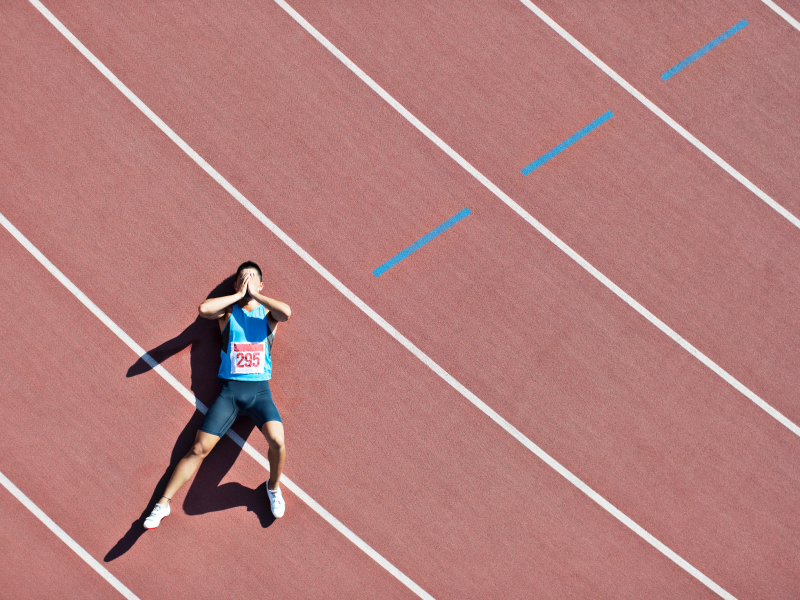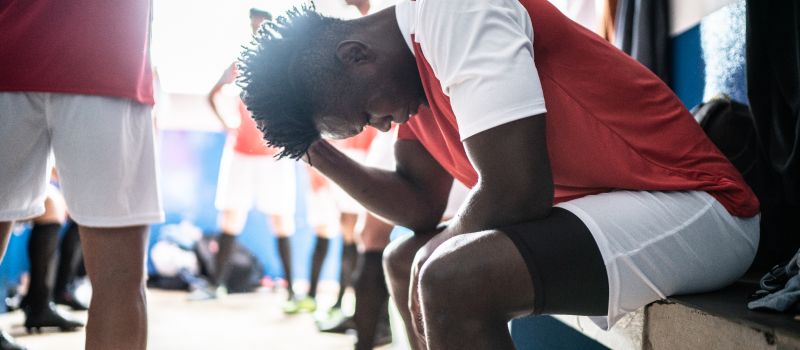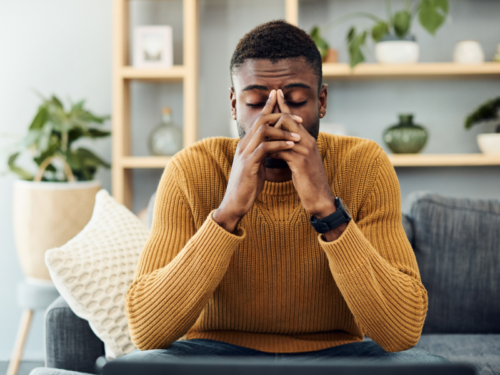
Table of Contents
Athlete Depression: The Link Between Sports and Mental Health

Written By: Ashley Laderer

Clinically Reviewed By: Dr. Don Gasparini
March 14, 2023
8 min.
Athlete depression has become a common concern amongst athletes of all levels. Learn more about the risk factors and signs.
Learn more about our Clinical Review Process
Table of Contents
There’s no denying that athletes deal with their fair share of mental health concerns. Whether someone is playing for a high school, college, or professional team or even competing in the Olympics, being an athlete comes along with its own set of unique challenges that can result in adverse mental health effects. One common phenomenon is athlete depression.
In the past several years, we have seen more and more people open up about their own mental health struggles –– even famous elite athletes. Professional athletes and Olympians such as swimmer Michael Phelps, tennis player Naomi Osaka, and gymnast Simone Biles have all publicly discussed their personal experiences with anxiety and depression. They have helped athletes of all levels who deal with mental health conditions realize that they are far from alone.
Here’s what you need to know about the connection between athletes and depression, the symptoms of depression, and treatment options.
What is the link between athletes and depression?
Athlete depression is a much-discussed topic these days, and for a good reason. Athletes’ mental health and well-being are just as important as their physical health.
Whether someone is a high school athlete or a college athlete, there are many reasons why these teens and young adults are at risk of depression. Here are some of the factors that can contribute to athlete mental health:
Pressure to perform
Athletes on high school or college teams are under a lot of pressure –– not just to help their team succeed and win, but also to perform well in school and keep their grades up. Athletes are pushed by their coaches and schools to give their 110% in their sport to make their team and school look good. This leads to both physical and mental exhaustion, and burnout.
Constant comparison
Whether they are comparing themselves to other athletes or their coaches are pointing out comparisons, athletes are constantly being stacked up against others. Dealing with this ongoing comparison may cause someone to experience blows to their self-esteem or feelings of inadequacy if they aren’t living up to what they imagined for themself or what their coach wants them to be.
Additional demands
Athletes face different demands as opposed to non-athlete classmates. Those on sports teams or in an individual sport may need to wake up extra early to train, have rigorous practice schedules, double-header games or matches, dietary restrictions, and more. This adds extra stress to an athlete’s life and gives them less time to focus on their schoolwork, social life, and of course, mental health.
Athletic identity tied to sports
For many athletes, their identity is directly linked to their athletic performance. Their life becomes consumed by their sport, and they view their identity as such. This puts further pressure on them because their self-worth becomes so tied to their performance. Not to mention, this can lead to more mental struggles down the line when someone stops playing a sport and is no longer a high school or college athlete, since they might struggle with losing their athletic identity and finding who they are outside of sports. Alternatively, if someone is still in school and on a team and has an injury where they can’t play anymore, this can also be devastating to their mental health and identity.
Join the Charlie Health Library
Get mental health updates, research, insights, and resources directly to your inbox.
You can unsubscribe anytime.
Facts and statistics about college athlete depression and mental health
- The prevalence of depression amongst college athletes may be higher than the prevalence of depression in the general population. While it’s estimated 5% of the general population is depressed, studies have found that depression rates amongst college athletes may range from 15.6% to 21%.
- Despite higher rates of depression and other mental health concerns, less than half of college athletes said they’d feel comfortable seeking mental health care on campus.
- Only 53% of college athletes believe their coaches take mental health concerns seriously.
- Only half of college athletes think that their school’s athletic department prioritizes athlete mental health.
- 44% of college athletes are stressed about their academic performance.
- 38% of female athletes and 22% of male athletes said they feel mentally exhausted constantly or almost every day.
Among all of the athletes, concerns are even higher amongst the following groups:
- Women
- People of color
- People in the LGBTQIA+ community
- People whose families are facing financial difficulties

Symptoms of depression
When people talk about depression, they are typically referring to what’s known as major depressive disorder, or MDD. This mood disorder can profoundly affect someone’s quality of life and functioning. Depression symptoms can cause someone to feel sad and empty as they go about their days, completely losing any joy and interest they used to have in things they used to enjoy. For high school and college athletes, this could mean that they no longer enjoy playing their sport or hanging out with their teammates, for example. People with depression might feel as though things are hopeless, and they may feel worthless or guilty as they suffer from these feelings. Symptoms can get in the way of all aspects of someone’s life – including school, work, family, friends, romantic relationships, and of course, sports in the case of athletes.
There are many depression symptoms, including:
- Feeling sad, empty, or hopeless
- Losing interest in activities you used to enjoy
- Difficulty with sleep (either having insomnia or sleeping too much)
- Fatigue
- Lack of energy
- Irritability
- Experiencing frustration or outbursts
- Feeling worthless
- Feeling guilty
- Blaming yourself
- Changes to appetite and weight (either losing appetite and losing weight, or having a greater appetite and cravings that cause weight gain)
- Feeling anxious, restless, or agitated
- Difficulty concentrating, making decisions, or thinking in general
- Having trouble with your memory
- Experiencing unexplained physical symptoms like aches and pains
- Speaking or moving slowly
- Thinking about death
- Having thoughts about suicide
Furthermore, teens might experience some more specific depression symptoms, such as:
- Not performing well at school
- Having poor school attendance
- Drinking or using drugs
- Self-harming
- Avoiding socializing
In order to be diagnosed with depression, you must experience major depressive symptoms for at least two weeks, and these symptoms must be interfering with your day-to-day functioning.
What are some other athlete mental health struggles?
Depression is far from the only mental health concern faced by high school athletes, college athletes, and elite athletes of all ages.
A recent study found that up to 35% of elite athletes may have a mental health condition –– defining elite athletes as those who play at a collegiate, professional, or Olympic level.
Aside from depression, other conditions that athletes may deal with include:
- Anxiety disorders
- Attention-deficit/hyperactivity disorder (ADHD)
- Bipolar disorder
- Eating disorders
- Post-traumatic stress disorder (PTSD)
- Substance use disorder
Do you need more support with
your mental health?
Charlie Health can help.
What is the treatment for depression in athletes?
Whether or not someone is an athlete, depression treatment looks the same. The two main treatments for depression are psychotherapy, also known as talk therapy, and psychiatric medications.
Two of the most commonly used types of therapy for depression are:
- Cognitive behavioral therapy (CBT): CBT is a type of talk therapy that is often the first line of treatment for many mental health conditions, including depression. It helps you become more aware of your thoughts and feelings, allowing you to reframe your negative beliefs and address any unhealthy, unhelpful behaviors worsening your depression. You’ll learn valuable new coping skills and strategies to deal with depression and other difficult emotions.
- Dialectical behavior therapy (DBT): DBT is a form of treatment that helps people understand and regulate their emotions. You’ll learn about acceptance and change –– accepting yourself and your current challenges while also understanding that it’s possible to make positive, healthy changes in your life if you put the work in. In a DBT program, there is a mix of individual therapy, supported groups, and skills training. Skills taught include mindfulness, distress tolerance, emotional regulation, and interpersonal effectiveness.
In some situations, people with depression may also need psychiatric medication, such as an antidepressant, on top of therapy. Your therapist might refer you to a psychiatrist who can determine if you are a good fit and could benefit from medication. Antidepressants can help to manage and reduce your symptoms alongside all the work you’re doing in therapy.
However, if you’re starting an antidepressant, it’s important to be aware that it might take a few weeks, at least, for the medication to take effect and for you to really feel a difference. Be patient during this time, and make sure that you bring up any concerns, such as side effects or worsening of symptoms, with your provider.
Additionally, it can take some trial and error to determine what medication or combination of medications is the best for your depression. When treating you, your psychiatrist will also take any co-occurring mental health conditions, such as anxiety, into consideration when devising your treatment plan.
What to do in a mental health crisis
Sadly, it is common for people with depression to struggle with suicidal thoughts. It can be scary to have these thoughts –– but you do not have to suffer alone if you’re thinking about hurting yourself or ending your life. Help is available 24/7 in case of mental health emergencies like this.
Here are a few great free and confidential resources that are ready to help you any time, any day:
- 988: 988 is the Suicide & Crisis Lifeline. All you have to do is text or call 9-8-8 to connect with a trained crisis counselor who is in your area. An online chat option is available, too.
- Crisis Text Line: Crisis Text Line is a texting-based service. Just text HOME to 741741 to talk to a crisis counselor. It’s also available on WhatsApp.
- The Trevor Project: If you’re part of the LGBTQIA+ community, The Trevor Project is a specialized resource. Call them at 1-866-488-7386, text ‘START’ to 678-678, or use their online chat.
These services can be life-saving in emergencies, but they are not a substitute for ongoing formal mental health treatment for depression. When you experience suicidal thoughts, getting help from a trained mental health professional is vital to prevent these emergencies from happening again.
How Charlie Health can help
If you or someone you know is an athlete struggling with depression or any other mental health concern, Charlie Health may be able to help you.
Our virtual intensive outpatient program provides mental health care for teens, young adults, and families who are coping with various mental health conditions, such as depression and any other co-occurring conditions.
Dealing with depression can be extremely difficult at times, but there is hope for you to feel relief from your symptoms and get back to living your life. With professional care and a supportive community, you can start feeling better.
Help is here now. Get started today.
References
https://ncaaorg.s3.amazonaws.com/research/other/2020/2022RES_NCAA-SA-Well-BeingSurveyPPT.pdf
https://bjsm.bmj.com/content/bjsports/53/11/667.full.pdf
https://www.mayoclinic.org/diseases-conditions/depression/symptoms-causes/syc-20356007
https://www.psychiatry.org/patients-families/depression/what-is-depression





